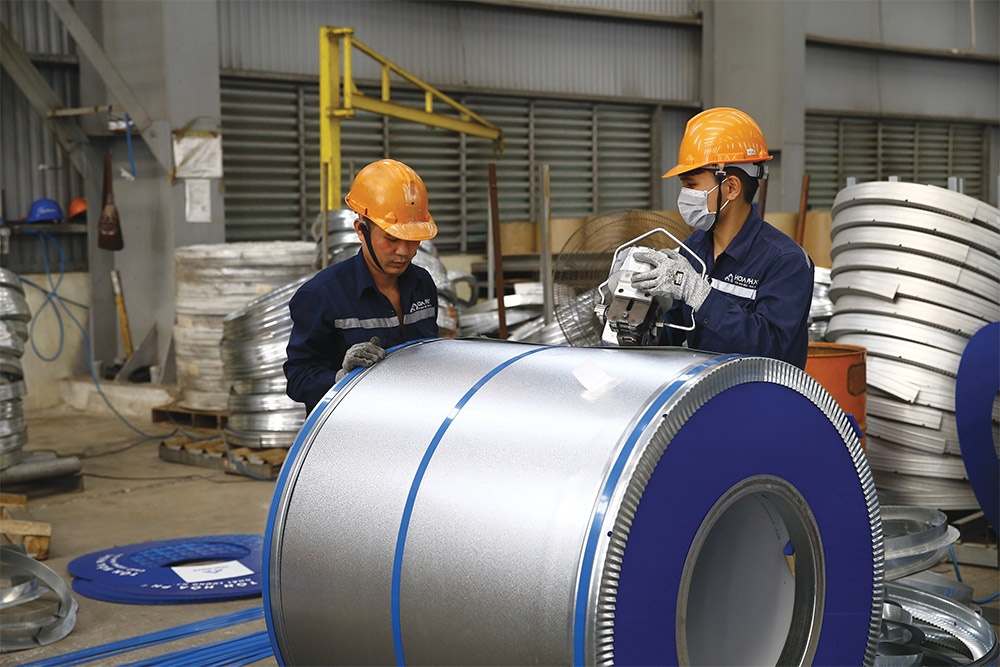Trade sector encouraged to go green
The Ministry of Industry and Trade (MoIT) last week issued a warning that Vietnam’s export landscape may be hurt by a grey global economic situation, featuring a plummet in demand.
 |
| Greening goods trade can spur existing industries to retool to green tech and remain competitive, Photo: Duc Thanh |
“The global economy is entering a new period full of risks and uncertainties, coupled with slow recovery of major trade partners, affecting Vietnam’s economic growth – especially when it comes to exports,” the MoIT stated.
According to the MoIT, many nations are increasingly applying their own protectionist policies aimed at placing specific restrictions on international trade to benefit their domestic economies.
“Many developed nations that are Vietnam’s key trade partners are paying more attention to sustainable development, coping with climate change, and safety for consumers. They are applying newer and stricter standards and regulations on supply chains, materials, labour, and the environment to imported products,” the MoIT stated.
In addition, many nations have also been diversifying their supplies outside China, with a focus placed on a number of partners similar to Vietnam such as Turkey, Mexico, India, Indonesia, and Bangladesh. This will increase competitiveness for Vietnam’s exports, it said.
“Vietnamese companies and exporters must pay more heed to greening their products before thinking about expanding export markets sustainably,” the MoIT said.
Green trade requirements
In May, Nguyen Viet Thang, deputy manager of a Vietnamese company producing cloth, worked with a partner from South Korea for the second time. However, after his company’s product samples were examined by the partner again, they were not accepted.
“The partner said that the products did not meet the standards in South Korea where customer awareness of environmentally friendly products is increasing. Their purchasing habits have changed,” Thang said. “The partner has set three standards on the limitations of dyes and durability of cloth which we cannot meet. Moreover, we also face strict labelling requirements. In Vietnam, we apply a standard on dye on fibre cloth, but it was not still accepted by the partner.”
This company is now focusing on the domestic market and several foreign markets with less strict requirements, such as Cambodia and Laos. “We will have to invest more money into production chains and new dying solutions if we want to win other markets like South Korea and Japan,” Thang said.
He calculated that if the South Korean partner accepted the products, his company might have earned as much as $600,000 in profit.
In South Korea, the Korean Certification (KC) is a compulsory certification mark indicating compliance with mandatory requirements. The KC mark must appear on certain textile or apparel items (including footwear and leather products) imported or sold in South Korea. The Korean Agency for Technology and Standards issues the mark for products that fall under its jurisdiction.
Vietnam’s total garments and textile exports to South Korea hit about $2.8 billion last year and $802 million in the first three months of this year, according to the General Department of Vietnam Customs.
In addition, South Korea is now also applying trade barriers including, for example, packaging materials regulations. According to Thang, other companies are also concerned about regulations for garments and textiles products.
For example, infant and children’s textile and leather products are regulated under the Special Act on Safety Management of Children’s Products, and are subject to the common safety standards for children’s products.
This applies to articles or accessories used by or for children under the age of 13. The standard covers hazardous substances and physical safety requirements.
However, Nguyen Hoang Huong, vice director of a garment company in Hanoi, admits that it might be difficult to meet this regulation as many of her company’s materials are imported from China with lower quality. “Thus, we might have to boost exports back to China or other regional markets such as Laos and Cambodia,” Huong said.
Nguyen Viet Ha, an expert from the MoIT’s Department of Science and Technology, said that along with customers in South Korea, those from many other markets in Asia and the wider world were tending to utilise environmentally friendly products.
“The origin of materials and how the products are produced are important now, and consumers are smart enough to accept or refuse your products,” Ha said. “Many markets are also imposing strict barriers on imported products to protect the environment, and if Vietnamese companies fail to meet the standards, they can easily lose their market.”
For instance, in Singapore, imported fresh fruit and vegetables are banned from containing any prohibited pesticides, and the level of pesticide residue or toxic chemical residue must not exceed the level specified in the Food Business Act, or recommendations of the Food and Agriculture Organization and the World Health Organization.
“Under Singaporean regulations, companies that import food must meet the requirements of the Food Sanitation Act and must be licensed by the competent authority,” Ha said. “Almost all key export markets of Vietnam, such as the EU, the US, Japan, and South Korea, have and will also impose more stringent regulations on imported products, and this has become a global trend.”
Technical impediments
From 2026, the EU’s Carbon Border Adjustment Mechanism (CBAM) will require importers of certain emissions-intensive goods like cement, iron and steel, aluminium, and fertilisers, to pay for the carbon embodied in these goods.
The CBAM is a carbon tax on all goods imported into EU markets, based on the intensity of greenhouse gas (GHG) emissions in the host country’s production process.
At present, this mechanism is in phase 1 when exporters, including steel ones, have to declare emission levels. However, when the CBAM embarks upon the next stage in 2026, steel firms in Vietnam will have to buy related emission certificates.
“The CBAM will have an impact on goods prices and may reduce competitiveness of products,” said Jennifer Pham, regional advisor on sustainable value chains at the Danish Embassy to Vietnam. “That’s why exporters of these products must have full understanding about the mechanism when they want to expand exports to the EU in the long term.”
Pham Cong Thao, deputy general director of the Vietnam Steel Corporation, said that the company has developed many solutions while facing such trade barriers.
In the short term, it will focus on meeting GHG inventory requirements from both the EU and the Vietnamese government; enhance production optimisation to reduce carbon emissions; prioritise units in the system with high technology levels and low emissions to produce steel for export; and also search for further raw green materials for production.
“In the medium and long term, in-depth investment, new investment, and research and application of breakthrough technology will be implemented to reduce emissions in production,” Thao said.
Last year, Vietnam exported over 2.5 million tonnes of assorted steel products to the EU, doubling from 2022, and accounting for 23 per cent of the country’s total export volume.
According to the MoIT’s Vietnam Institute of Strategy and Policy for Industry and Trade, under the CBAM, the domestic steel industry will suffer from a 4 per cent reduction in export value, leading to a decrease in output of 0.8 per cent, coupled with the adverse effects of reduced competitiveness.
The World Bank said that many companies in Vietnam and the country’s trade sector are facing great pressures from international markets, which are increasingly requiring environmentally friendly products.
While trade serves as an important impetus for Vietnam’s economic growth over the past two decades, it is also a big emitter of GHG emissions, responsible for one-third of the country’s total emissions. This includes agriculture, manufacturing, and transport services, the World Bank said.
“The rapid development of manufacturing and the type of manufacturing have led to increased GHG emissions indirectly, as the sector uses electricity, steam, heat, or cooling to function,” it said, adding, “Vietnam has started decarbonising its trade, but increasingly, customers in destination markets and multinational companies demand greener products and services. Also, many foreign-invested enterprises are part of values chains where the central corporations have committed to greener practices as part of their corporate social and environmental commitments.”
| Greening goods trade is a priority for several reasons. Firstly, it can help reduce the carbon or environmental footprint of trade industries. In turn, these reductions contribute to the implementation of a green, resilient, and inclusive development approach and help Vietnam reach its national mitigation objectives. Secondly, greening goods trade can spur existing industries to retool to green technology and remain competitive in the future low carbon world. Thirdly, it can offer new opportunities for trading in environmental goods and services. Finally, greening trade is expected to be a potential driver of new jobs as existing industries retool and businesses take advantage of opportunities in new environmental goods and services. Source: World Bank |
 | Greening your bottom-line for sustainable development Witnessing the world buckling to deal with the environmental pollution has not only changed consumer sentiment but also affected people’s job preferences. While consumers tend to favour green brands, workers are more likely to click "apply" for companies committed to creating long-term values. Greening is not only a trend but also a “must-have” for businesses wishing to attract talent and develop sustainably. |
 | Greening the furniture industry: What needs to be done? With a series of new regulations relating to the manufacture and export of wooden furniture products, what do furniture businesses need to prepare to meet the stringent market requirements? |
What the stars mean:
★ Poor ★ ★ Promising ★★★ Good ★★★★ Very good ★★★★★ Exceptional
Related Contents
Latest News
More News
- Masan Consumer names new deputy CEO to drive foods and beverages growth (February 23, 2026 | 20:52)
- Myriad risks ahead, but ones Vietnam can confront (February 20, 2026 | 15:02)
- Vietnam making the leap into AI and semiconductors (February 20, 2026 | 09:37)
- Funding must be activated for semiconductor success (February 20, 2026 | 09:20)
- Resilience as new benchmark for smarter infrastructure (February 19, 2026 | 20:35)
- A golden time to shine within ASEAN (February 19, 2026 | 20:22)
- Vietnam’s pivotal year for advancing sustainability (February 19, 2026 | 08:44)
- Strengthening the core role of industry and trade (February 19, 2026 | 08:35)
- Future orientations for healthcare improvements (February 19, 2026 | 08:29)
- Infrastructure orientations suitable for a new chapter (February 19, 2026 | 08:15)

 Tag:
Tag:


















 Mobile Version
Mobile Version